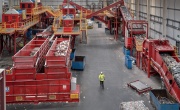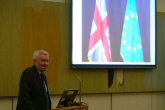Resource Association calls for collaboration to shape future resources policy

With the UK’s political landscape in a certain amount of disarray following the result of the EU referendum and its fallout, businesses in all sectors are anxiously waiting to see what will happen to the nation’s policy on a wide variety of issues when the domestic situation and the relationship with Europe is determined.
Speaking at the body’s annual summer lecture, Peter Clayson, Chairman of the Resource Association, which works to promote the value of reprocessing and recycling in the UK, said: “The priority for businesses is to continue to satisfy their customers and carry on with business as usual. From a longer term policy perspective, it is unlikely to stay as business as usual, and the resource sector will have to work hard to ensure its priorities are near the top of the new agenda.”
Association Chief Executive Ray Georgeson, meanwhile, asserted that while the circular economy may not be the government’s top priority, it is up to the industry to “press for some early signals as to how the government intends to move forward on resources and waste policy and the circular economy”.
The Department for Environment, Food & Rural Affairs (Defra) came under fire from the industry in February when it released a five-year plan that virtually ignored the resource industry, only briefly commenting on the department’s desire to tackle waste crime.
The plan for 2015-2020 was to create a ‘comprehensive’ 25-year plan for the environment by the end of 2016, but following the Brexit vote, this has now been delayed until next year at the earliest.
Georgeson says, however, that the change could provide an opportunity for the industry to find a greater role in government policy.
Closing the event, he said: “Understandably, despite uncertainties and fluidity, attention is starting to turn towards how we may find opportunity in the new political and policy landscape for the UK. We need clear signals from government, but the onus must also be on our industry to help shape our own future.
“We stand ready to help, and call on our colleagues across the sector to work together to find new ways to collaborate to shape future strategy. It’s clear that our colleagues in Defra will need support, and we will need to step up to the plate. The challenge of working through the variety of interests and possible tensions over priorities must be tackled, and I believe we can do this in an innovative and energising way if we choose to do so.
“We have the fora, the people and the knowledge to do this well. All we need now is the desire and appetite to shape the new landscape for our industry.”
Learning from Ljubljana
The main lecture at the event was given by Jože Gregorič, Project Manager at Snaga, the company that manages waste and resource in Ljubljana, the European Green Capital for 2016. In 2014, the Slovenian capital became the first capital city in the European Union to adopt a zero waste goal.
In 2010, Slovenia reported a municipal recycling rate of 22 per cent, but by 2013 this had increased to 42 per cent. Gregorič explained to those at the lecture how the Slovenian capital has spent the last 10 years building high participation in separate collection, utilising ‘radical approaches’ to communications and significantly lowering residual waste per capita.
Georgeson told the event that regardless of the future status of the UK in relation to the EU, “we would still benefit from learning from our European neighbours and sharing our own good practice”.
More information about the rapid improvement in waste management in Ljubljana is available in Resource’s feature article, which was informed a detailed interview with Gregorič.








